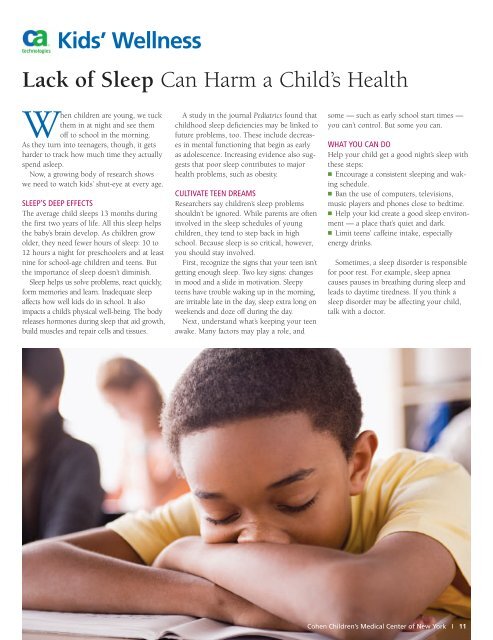Les Nelkin Pediatric Cancer Survivors Day - North Shore-LIJ Health ...
Les Nelkin Pediatric Cancer Survivors Day - North Shore-LIJ Health ...
Les Nelkin Pediatric Cancer Survivors Day - North Shore-LIJ Health ...
Create successful ePaper yourself
Turn your PDF publications into a flip-book with our unique Google optimized e-Paper software.
Kids’ Wellness<br />
Lack of Sleep Can Harm a Child’s <strong>Health</strong><br />
When children are young, we tuck<br />
them in at night and see them<br />
off to school in the morning.<br />
As they turn into teenagers, though, it gets<br />
harder to track how much time they actually<br />
spend asleep.<br />
Now, a growing body of research shows<br />
we need to watch kids’ shut-eye at every age.<br />
SleeP’S deeP eFFeCtS<br />
The average child sleeps 13 months during<br />
the first two years of life. All this sleep helps<br />
the baby’s brain develop. As children grow<br />
older, they need fewer hours of sleep: 10 to<br />
12 hours a night for preschoolers and at least<br />
nine for school-age children and teens. But<br />
the importance of sleep doesn’t diminish.<br />
Sleep helps us solve problems, react quickly,<br />
form memories and learn. Inadequate sleep<br />
affects how well kids do in school. It also<br />
impacts a child’s physical well-being. The body<br />
releases hormones during sleep that aid growth,<br />
build muscles and repair cells and tissues.<br />
A study in the journal <strong>Pediatric</strong>s found that<br />
childhood sleep deficiencies may be linked to<br />
future problems, too. These include decreases<br />
in mental functioning that begin as early<br />
as adolescence. Increasing evidence also suggests<br />
that poor sleep contributes to major<br />
health problems, such as obesity.<br />
CultIvate teen dreaMS<br />
Researchers say children’s sleep problems<br />
shouldn’t be ignored. While parents are often<br />
involved in the sleep schedules of young<br />
children, they tend to step back in high<br />
school. Because sleep is so critical, however,<br />
you should stay involved.<br />
First, recognize the signs that your teen isn’t<br />
getting enough sleep. Two key signs: changes<br />
in mood and a slide in motivation. Sleepy<br />
teens have trouble waking up in the morning,<br />
are irritable late in the day, sleep extra long on<br />
weekends and doze off during the day.<br />
Next, understand what’s keeping your teen<br />
awake. Many factors may play a role, and<br />
some — such as early school start times —<br />
you can’t control. But some you can.<br />
What YOu Can dO<br />
Help your child get a good night’s sleep with<br />
these steps:<br />
◾ Encourage a consistent sleeping and waking<br />
schedule.<br />
◾ Ban the use of computers, televisions,<br />
music players and phones close to bedtime.<br />
◾ Help your kid create a good sleep environment<br />
— a place that’s quiet and dark.<br />
◾ Limit teens’ caffeine intake, especially<br />
energy drinks.<br />
Sometimes, a sleep disorder is responsible<br />
for poor rest. For example, sleep apnea<br />
causes pauses in breathing during sleep and<br />
leads to daytime tiredness. If you think a<br />
sleep disorder may be affecting your child,<br />
talk with a doctor.<br />
Cohen Children’s Medical Center of of New York I I 11<br />
11




